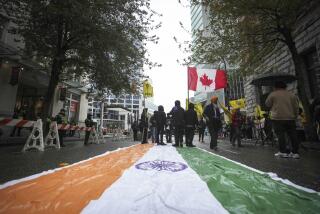CRISIS IN THE BALKANS : Snared in Balkans, Canada Questions Peacekeeping Role : Military: Answering U.N. call has been a keystone of Ottawa’s policy. Now many citizens are disillusioned.
- Share via
OTTAWA — Among the most serious casualties of the current Bosnian crisis could be one of the world’s most committed and long-serving proponents of international peacekeeping: Canada.
With its soldiers held hostage by Bosnian Serbs twice in six months, its government left uninformed and unconsulted by its allies and its armed forces humiliated and frustrated in other recent U.N. operations, the nation that has sent troops to 31 peacekeeping operations in the last 47 years is seriously questioning the continuation of its role.
“We don’t know what to do,” said York University historian Jack L. Granatstein, a former army officer and prominent Canadian military expert. “We’re seriously adrift.”
On the record and for the moment, the government of Liberal Party Prime Minister Jean Chretien says it is committed to the Bosnian operation. But interviews with ordinary Canadians and a wide range of editorial opinion show that Granatstein’s assessment reflects a growing disillusionment with what has been the keystone of the nation’s foreign policy--and the source of its pride as something special among world powers.
For the first time since Canada sent its first soldier to help mediate an international dispute--in Palestine in 1948--a major political party is opposing peacekeeping and is demanding that Canada pull out of Bosnia-Herzegovina.
The nation’s military is under investigation for its role in the torture and killing of a civilian teen-ager during a peacekeeping operation in Somalia in March, 1992. And Parliament has ordered the already understaffed and poorly equipped army--from which peacekeepers are drawn--reduced from 70,000 troops to 60,000 by 1999. Of the current total, no more than 20,000 are army infantry.
A telling symbol of Canada’s disenchantment can be seen at its monument to peacekeeping, in a park just behind the country’s Parliament buildings. The monument is stark and proud, a memorial not to triumphs in war but to success in trying to stop wars. These days, workers scrub away graffiti ridiculing Canada’s presence in Bosnia and in previous operations.
Public disenchantment was heightened in December when Canadians were taken hostage for the first time by Bosnian Serbs. One soldier was held for 16 days.
“It was a wonder that the public wasn’t even angrier then,” said a government official who asked not to be named. “After all, we have had 10 soldiers killed in Bosnia.”
The Reform Party, Canada’s strong third political party, openly called for a withdrawal from Bosnia after the December hostage-taking, a demand the party continues to make. It is the first time there has been a political split over peacekeeping.
Asked if the Reform Party, which largely represents Canada’s conservative middle provinces, reflects national discontent, Granatstein said: “Yes. Reform reflects a serious movement in public opinion. There is a diminishing support nationwide. Even the Liberals are torn. They would like to be a good ally, but they are confused.”
Lt. Gen. Lewis MacKenzie, a Canadian military legend who recently retired after serving in 10 peacekeeping operations, agrees.
“There is public disillusion and all but total misunderstanding of what is going on,” he said in an interview.
In Granatstein’s and MacKenzie’s view--and that of others who declined to speak on the record--the real problem touches on Canada’s role in the world.
At the end of World War II, Granatstein said, Canada found itself caught in the middle of the growing Cold War.
“The idea was that we could be the ideal middleman,” he said. “The United States makes war, and Canada makes peace. So, we decided that peacekeeping is what we do best, and we do it better than anyone else.”
Canada met the United Nations’ 1992 request for help in Bosnia by sending 835 troops; they were the first to arrive.
In addition, the government here contributed more than 1,200 soldiers in Croatia, making Canada the only country to operate in all three peacekeeping theaters in the former Yugoslav federation. Only France and Britain have more peacekeepers in the area.
Besides the hostage-taking, Canadian politicians and military officers say they feel left out by their allies. Canada, for instance, is not a member of the five-nation Contact Group that advises and sets policy for the peacekeeping operation.
MacKenzie said Chretien “told me that we’d never been asked.”
And according to government and military officials, neither the United Nations nor NATO gave Canada notice that American planes were going to bomb Bosnian Serb arms sites last month--a move for which the rebels retaliated by seizing dozens of isolated and defenseless Canadian troops.
“We would have opposed it [the bombing],” said one military official, “because it didn’t have a specific and tactical objective.”
The government confusion over its future policy is shown, MacKenzie said, by its policy toward the military in general.
Canada’s soldiers are, in Granatstein’s words, “equipped worse than the Serbs.” And although they are some of the best trained in the North Atlantic Treaty Organization, the troops cannot sustain themselves in the field.
Some of the regular army forces are now serving their fourth rotation in Bosnia and have had to be reinforced by reservists, men who drill one day a month and are not given basic nine-week training until they are ordered to Bosnia.
“All of this is very dangerous,” said another military expert. “We didn’t make a proper analysis of the risk, and now we are in a snake pit, a mess that is only going to get worse.”
More to Read
Sign up for Essential California
The most important California stories and recommendations in your inbox every morning.
You may occasionally receive promotional content from the Los Angeles Times.













